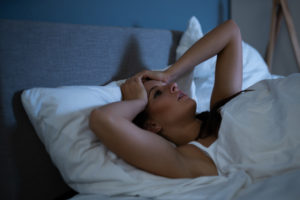
Sleep is one of the basic building blocks of good health.
It boosts immunity, regulates hormones, helps with food digestion and provides the energy needed for daily living.
When you’re well-rested, you can be fully present and functioning—at gym workouts, in relationships, at work or wherever you need to be.
Experts from the Spectrum Health Women’s Health and Wellness Center answered some common sleep questions and offered tips on getting a good night’s sleep:
What counts as insomnia?
Insomnia comes in three basic flavors: taking longer than 30 minutes to fall asleep, being awake for at least 30 minutes during the night, and waking up more than 30 minutes prior to your desired wake time.
Some people experience all three issues. Others experience only one. But any amount or combination of the three counts as insomnia.
What causes insomnia?
The causes of insomnia are practically endless. As behavioral sleep medicine specialist Donn Posner said in the podcast Ten Percent Happier, “I now say to my trainees, ‘You can probably open the dictionary, put your finger down on a word and find something that causes insomnia.’”
If you’re having trouble falling asleep or staying asleep these days, you’re definitely not alone.
Some common causes include illness, physical pain, change in environment, anxiety, depression, stress and major life changes. Even positive changes can affect sleep. Getting married or having a baby can trigger insomnia, even though we usually think of these things as good.
What’s acute insomnia?
Acute insomnia describes anyone who has been experiencing insomnia for anywhere between three nights and three months.
What’s chronic insomnia?
Known among sleep experts as insomnia disorder, this describes people who have been having trouble with insomnia for at least three nights each week for longer than three months and have associated daytime symptoms such as fatigue, sleepiness, concentration problems, performance issues or mood swings.
If I have acute insomnia, how can I avoid chronic insomnia?
Pay attention to your sleep cycle, especially your wake time. This is the No. 1 regulator of your circadian rhythm, which governs when you feel tired and when you feel awake.
You can reset your internal clock and keep acute insomnia from becoming a runaway problem. Wake up at the same time each day and get exposure to sunlight—or the closest equivalent you can find—as soon as possible after waking up. Maintain wakefulness for at least seven to nine hours.
What if I have chronic insomnia?
First, try the usual remedies. Wake up at the same time each day and go to bed at the same time. Establish a bedtime routine and avoid screen time within two hours of bedtime. Eliminate caffeine and alcohol from your diet.
If your insomnia persists after a sustained effort with these lifestyle remedies, it’s time to seek help from a professional.
Unwinding patterns that have persisted for months or years can require specialized expertise. The recommended first-line treatment for chronic insomnia is cognitive behavioral therapy for insomnia, followed by short-term use of medication.
The Women’s Health and Wellness Center has certified psychotherapists trained in this type of therapy.
How much sleep do I need?
Many sleep experts say you need anywhere from seven to nine hours of sleep a night. But the truth is, everyone’s different—and much of the answer will depend on your age, gender, health status and other factors. It might also change throughout your lifetime.
To figure out the answer for you right now, ask yourself, “When I feel rested, awake and alert for the majority of the day, how much sleep did I get during the five to seven nights prior?”
I love sleeping in on the weekends. Is that bad?
Not necessarily. As long as you’re waking up at about the same time at least five days a week, sleeping in an hour or two on the weekends isn’t going to change your circadian rhythm.
A well-regulated internal clock can take a bit of deviation from the norm.
Am I doing something wrong?
If you wake up and go to bed at the same time each night—but you don’t fall asleep—are you doing something wrong?
You may be trying to get more sleep than you really need. If you routinely go to bed before you’re tired, this can throw off your circadian rhythm and, paradoxically, cause insomnia.
If you routinely feel tired in places that aren’t your bed—the couch, let’s say—and yet can’t fall asleep when you snuggle under the covers, then you might be associating your bed with the experience of anxiety and stress. This isn’t uncommon among insomnia sufferers.
If you’re routinely taking longer than 15 minutes to fall asleep or get back to sleep, get up.
Don’t lie in bed and ruminate. Go to another room, read a book, do a chore, listen to music or a podcast. Stay away from screens and bright light.
Do something that redirects your attention from how much sleep you’re not getting.
While it might sound counterintuitive, one of the best ways to address insomnia is not to worry about it in the moment. Focusing on your insomnia as a problem to be solved will only pour gas on the fire—because try as you might, you can’t force yourself to fall asleep.
Instead, focus on establishing good rhythms and patterns in your daily life.
By creating comfortable routines, from your sleep/wake times to your mealtimes to regular times for work, play and exercise, you can reboot the natural processes that make good sleep possible.
 /a>
/a>
 /a>
/a>
 /a>
/a>